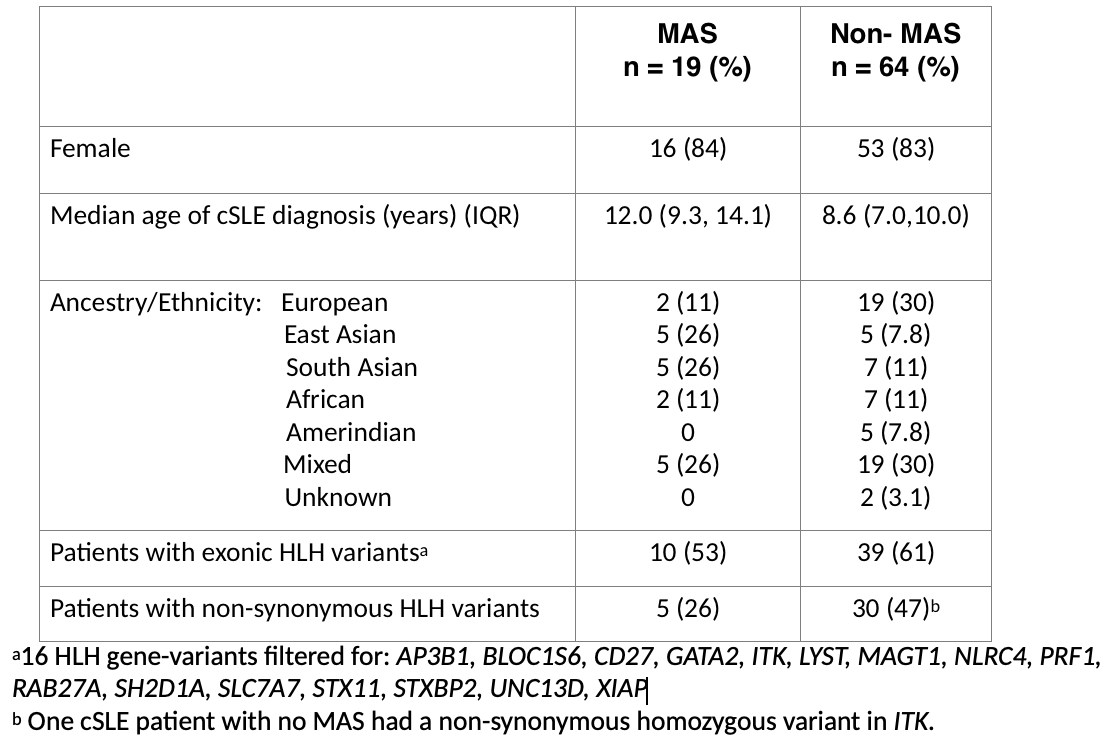Background/Purpose: Hemophagocytic lymphohistocytosis (HLH) is a life-threatening hyper-inflammatory syndrome characterized by excessive activation and proliferation of T-lymphocytes and macrophages. Familial HLH (fHLH), is an autosomal recessive disorder. Macrophage activation syndrome (MAS) is also called secondary HLH due to its clinical and biological similarity to fHLH. MAS is increasingly recognized as a complication of SLE. The study aim was to compare the number of fHLH protein-coding (exonic) variants in childhood-onset SLE (cSLE) patients with and without MAS.
Methods: SickKids Hospital (Toronto) is a tertiary care clinic that diagnose and follow cSLE (diagnosed < 18y) patients, meeting ACR and/or SLICC classification criteria. Nineteen patients with MAS (physician expert diagnosis) had paired-end whole exome sequencing (WES) by Illumina HiSeq 2500 platform. For the non-MAS cohort, 64 patients suspected of harbouring monogenic lupus rare variants due to young age diagnosis (< 11y), consanguinity or multiple affected first-degree relatives, underwent paired-end whole-genome sequencing (WGS) by Illumina HiSeq X platform. For both cohorts, we restricted to exonic regions of 16 HLH-specific genes (AP3B1, BLOC1S6, CD27, GATA2, ITK, LYST, MAGT1, NLRC4, PRF1, RAB27A, SH2D1A, SLC7A7, STX11, STXBP2, UNC13D, XIAP). Read depths were: WES 70-118X and WGS 37-40X. Variant calling was completed with GATK and HAS, and functional annotation with ANNOVAR at The Centre for Applied Genomics (TCAG), SickKids (annotation pipeline, v26.2, v.26.5). Small variants were recalled and reannotated with gatk4/bcbio/VEP/vcfanno gemini. Non-synonymous variants with MAF < 0.05 were prioritized. Ancestry was inferred for 87% of patients using Illumina MEGA genotyping with 1000 Genomes Project as a referent; otherwise self-reported ethnicity was utilized.
Results: A higher proportion of cSLE patients were female in MAS and non-MAS cohorts; however, the age of diagnosis was younger in the non-MAS cohort and the ethnicity distributions were different between the two groups. A total of 15 HLH exon variants found among 19 cSLE patients with MAS and 76 HLH exon variants among 64 cSLE patients without MAS. In regards to non-synonymous (exonic) variants, there were 11/15 (73%) in the MAS cohort versus 42/76 (55%) in the non-MAS cohort; the difference was non-significant (p=0.26). Only 1 patient was homozygous for a non-synonymous variant in ITK gene but this variant was predicted as benign by Polyphen and SIFT. In both cohorts, STXBP2 and LYST were the most commonly carried non-synonymous variants. Both cohorts had genes harbouring >1 non-synonymous variants, however all the variants were deemed ‘benign’ or ‘tolerated’.
Conclusion: In the cSLE patients who underwent WES or WGS, we did not observe a difference in the prevalence of non-synonymous HLH genetic variants in patients with MAS compared to non-MAS. This likely due to limited sample size, and a non-MAS comparator group that may be enriched for rare pathogenic variants in part due to young age of cSLE onset. Future sequencing studies in larger cohorts of matched MAS and non-MAS cSLE patients are required to validate our findings.
The post Hemophagocytic Lymphohistiocytosis (HLH) Genetic Variants in Childhood-onset SLE (cSLE) with Macrophage Activation Syndrome (MAS) appeared first on ACR Meeting Abstracts.
